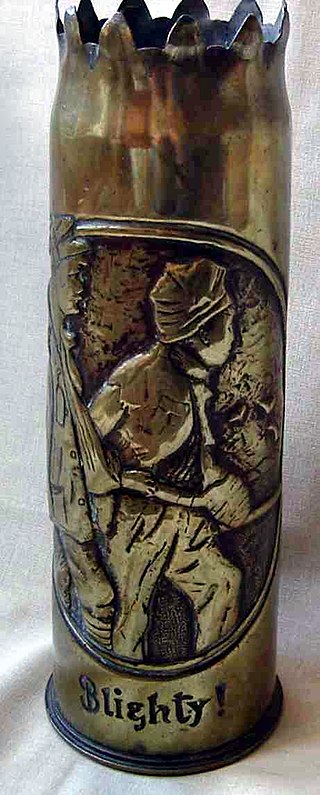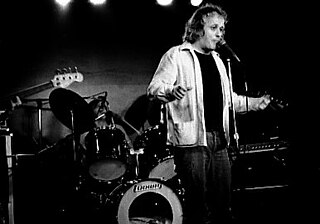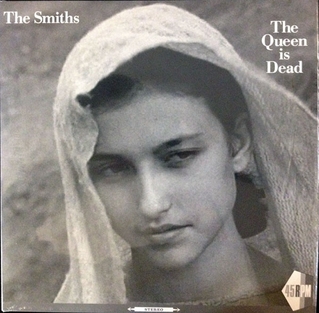Related Research Articles

"Barbara Allen" is a traditional folk song that is popular throughout the English-speaking world and beyond. It tells of how the eponymous character denies a dying man's love, then dies of grief soon after his untimely death.

"Blighty" is a British English slang term for Great Britain, or often specifically England. Though it was used throughout the 1800s in the Indian subcontinent to mean an English or British visitor, it was first used during the Boer War in the specific meaning of homeland for the English or British, and it was not until World War I that use of the term became widespread.

Kevin Coyne was an English musician, singer, composer, film-maker, and a writer of lyrics, stories and poems. He was born in Derby, Derbyshire, England, and died in his adopted home of Nuremberg, Bavaria, Germany.

"Danny Boy" is a song with lyrics written by English lawyer Frederic Weatherly in 1910, and set to the traditional Irish melody of "Londonderry Air" in 1913.

Skye Edwards, sometimes simply Skye, is a British singer-songwriter. Her career began in the mid-1990s when she and the Godfrey brothers formed the band Morcheeba, which released five albums with Skye as lead vocalist. In 2003, the band split, after which Skye released two solo albums: Mind How You Go in 2006, and Keeping Secrets in 2009. In 2010, Edwards returned to Morcheeba, again as lead vocalist. In 2012, she released her third solo album, Back to Now, while in 2015 she released her fourth album, In a Low Light.
"Cold, Cold Heart" is a country music and pop song written and first recorded by Hank Williams. This blues ballad is both a classic of honky-tonk and an entry in the Great American Songbook.

William Holt Williams was an Australian-born British vaudeville and music hall singer and entertainer. His best known song was "When Father Papered the Parlour".

Florrie Forde was an Australian-born British vaudevillian performer and popular singer, notable in music hall and pantomime. From 1897 she lived and worked in the United Kingdom, where she found her greatest success, as one of the most popular stars of the early 20th century as a music hall entertainer and recording artist.
"They Can't Take That Away from Me" is a 1937 popular song with music by George Gershwin and lyrics by Ira Gershwin. It was introduced by Fred Astaire in the 1937 film Shall We Dance and gained huge success.

"The Cat Came Back" is a comic song written by Harry S. Miller in Christmas 1893. It has since entered the folk tradition and been recorded under variations of the title—"But the Cat Came Back", "And the Cat Came Back", etc. It is also a popular children's song.
George Bruno "Zoot" Money was an English vocalist, keyboardist and bandleader. He is best known for his playing of the Hammond organ and association with his Big Roll Band. Inspired by Jerry Lee Lewis and Ray Charles, he was drawn to rock and roll music and became involved in the music scenes of Bournemouth and Soho during the 1960s. He took his stage name "Zoot" from Zoot Sims after seeing him in concert.
"I Know Where I'm Going" is a traditional Scottish ballad about a wealthy love-struck young woman pining for her "bonnie" lover Johnny who some say has a bad reputation. It has been noted since the early nineteenth century. It is Roud number 5701.
Fred Godfrey was the pen name of Llewellyn Williams, a World War I songwriter. He is best known for the songs "Take Me Back to Dear Old Blighty" (1916) and "Bless 'Em All" (1917), which became a 1940s hit when recorded by George Formby and which can be found on many war films.
"Bless 'Em All", also known as "The Long and the Short and the Tall" and "Fuck 'Em All", is a war song. The words have been credited to Fred Godfrey in 1917 set to music composed by Robert Kewley, however, early versions of the song may have existed amongst British military personnel in the 1880s in India. It was first recorded by George Formby, Jr. in 1940, and it has been covered by a number of other artists including Gracie Fields and Vera Lynn. It served as a patriotic song during the Second World War.
Bennett Scott was an English writer of music hall songs.

Complete is a box set compilation by English rock band the Smiths, released by Rhino Records on 26 September 2011. The standard CD and LP versions contain the band's four studio albums The Smiths, Meat Is Murder, The Queen Is Dead and Strangeways, Here We Come, their only live album Rank and the three compilation albums released while the band were still active–Hatful of Hollow, The World Won't Listen and Louder Than Bombs–on eight CDs or eight LPs. A deluxe version contains those eight albums on both CD and LP formats, as well as 25 seven-inch vinyl singles and a DVD.

Dynamite Daze is a studio album by the rock artist Kevin Coyne. It was released in 1978 by Virgin Records.

"The Queen Is Dead" is a 1986 song by English alternative rock band the Smiths, appearing on their third studio album of the same name. Written by Morrissey and Johnny Marr, the song features anti-monarchist lyrics that attracted controversy in the UK music press. Musically, the song was a result of experimentation and jamming, with Marr and rhythm section Andy Rourke and Mike Joyce using technology in the studio to enhance their performances.
Arthur John Mills (1872–1919) was an English lyricist of music hall songs, many written with Fred Godfrey and Bennett Scott.
Elinor Maud Dawe, who used the stage name Ella Retford, was an English music hall comedian, singer and dancer, and later a stage and film actress.
References
- ↑ "He wrote the songs Britain sang". The Bulletin. 23 February 1953. Retrieved 22 April 2011.
- 1 2 "ShieldSquare Captcha". www.songfacts.com.
- 1 2 "First World War.com - Vintage Audio - Take Me Back to Dear Old Blighty". www.firstworldwar.com.
- ↑ "Dynamite Daze - Kevin Coyne | Songs, Reviews, Credits | AllMusic" – via www.allmusic.com.
- ↑ "[Take Me Back To] Dear Old Blighty" – via www.youtube.com.
- ↑ Haworth, Catherine; Colton, Lisa (3 March 2016). Gender, Age and Musical Creativity. Routledge. ISBN 9781317130055 – via Google Books.
- ↑ "'Bring It Back to Blighty' - World Cup Song 2010" – via www.youtube.com.